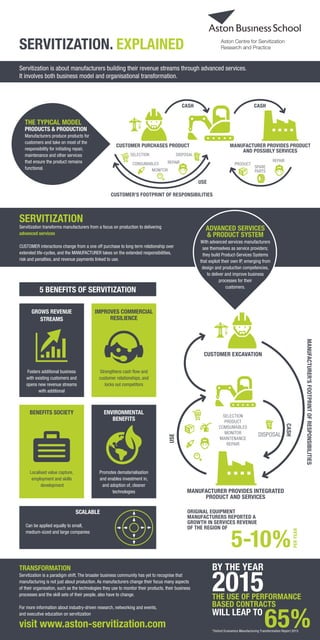Servitization Infographic Aston Centre for Servitization Research and Practice
- 1. SERVITIZATION. EXPLAINED Servitization is about manufacturers building their revenue streams through advanced services. It involves both business model and organisational transformation. THE TYPICAL MODEL PRODUCTS & PRODUCTION Manufacturers produce products for customers and take on most of the responsibility for initiating repair, maintenance and other services that ensure the product remains functional. SERVITIZATION Servitization transforms manufacturers from a focus on production to delivering advanced services CUSTOMER interactions change from a one off purchase to long term relationship over extended life-cycles, and the MANUFACTURER takes on the extended responsibilities, risk and penalties, and revenue payments linked to use. ADVANCED SERVICES & PRODUCT SYSTEM With advanced services manufacturers see themselves as service providers; they build Product-Services Systems that exploit their own IP, emerging from design and production competencies, to deliver and improve business processes for their customers. 5 BENEFITS OF SERVITIZATION GROWS REVENUE STREAMS IMPROVES COMMERCIAL RESILIENCE Fosters additional business with existing customers and opens new revenue streams with additional Strengthens cash flow and customer relationships, and locks out competitors BENEFITS SOCIETY Localised value capture, employment and skills development ENVIRONMENTAL BENEFITS Promotes dematerialisation and enables investment in, and adoption of, cleaner technologies SCALABLE Can be applied equally to small, medium-sized and large companies CUSTOMER’S FOOTPRINT OF RESPONSIBILITIES CUSTOMER PURCHASES PRODUCT MANUFACTURER PROVIDES PRODUCT AND POSSIBLY SERVICES CASHCASH USE SELECTION CONSUMABLES MONITOR REPAIR REPAIR DISPOSAL PRODUCT SPARE PARTS CASH DISPOSAL CUSTOMER EXCAVATION CAPABILITY MANUFACTURER PROVIDES INTEGRATED PRODUCT AND SERVICES MANUFACTURER’SFOOTPRINTOFRESPONSIBILITIES USE SELECTION PRODUCT COMSUMABLES MONITOR MAINTENANCE REPAIR ORIGINAL EQUIPMENT MANUFACTURERS REPORTED A GROWTH IN SERVICES REVENUE OF THE REGION OF 5-10% PERYEAR TRANSFORMATION Servitization is a paradigm shift. The broader business community has yet to recognise that manufacturing is not just about production. As manufacturers change their focus many aspects of their organisation, such as the technologies they use to monitor their products, their business processes and the skill sets of their people, also have to change. For more information about industry-driven research, networking and events, and executive education on servitization visit www.aston-servitization.com BY THE YEAR 2015THE USE OF PERFORMANCE BASED CONTRACTS 65%*Oxford Economics Manufacturing Transformation Report 2013 WILL LEAP TO
